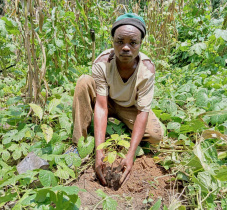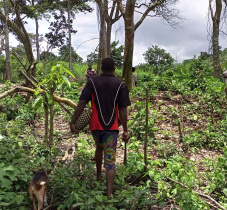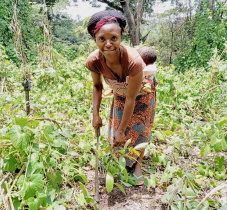Project description
In Togo, our reforestation project aims to teach agroforestry methods to families from 15 villages in the western Plateaux region. Support APAF International, Reforest'Action's field partner, in planting fertilizer and fruit trees.
The project at a glance
Number of trees to be planted: 450 000
Species planted: Cacao tree, Avocado, Citrus, Rain tree, Congo walnut…
Planting period : between april and october 2022
Context
Togo is currently facing major environmental problems, notably the destruction of its forest cover, a phenomenon due to the practice of slash-and-burn agriculture as well as unregulated logging for domestic use or resale. These practices lead to soil erosion and degradation of arable land, which results in reduction of agricultural productivity and an increasingly difficult supply of firewood and timber for the local population.
In villages located in the prefectures of Kloto, Akebou and Wawa, Reforest'Action's partner in the field, NGO APAF, trains producers in various agroforestry techniques. This approach aims to promote the introduction of fertilizer trees, as well as forest and fruit species over a surface area of more than 680 hectares in order to re-fertilise the soil in a natural and sustainable way. In the long term, the project will also promote the sustainable production of forest goods: wood, fruits, honey, etc., secure food security for local communities and enable producers to develop additional sources of income.
The planting project
Fertilizer and forest trees as well as fruit trees are being introduced into the agroforestry fields of farming families, thus enabling the establishment of agroecosystems, which are conducive to the preservation of the soil and the productivity of the agricultural land, as well as to the development of additional income for the farmers and their families.
At the same time, forest trees are being planted to recreate private or public forests, thus helping to redensify the vegetation cover of the areas concerned.
In total, 450.000 fertilizer and/or forest and fruit trees will be planted on a 687-hectare area, during the project period.
Benefits of the project
The agroforestry trees planted will protect the underlying crops in the long term and provide the local population with new sources of income from the sale of food crops. The fast-growing species also planted in agroforestry will provide new wood resources for local communities, thus helping to regulate the uncontrolled cutting of existing forests.
The species planted, chosen for their resistance to the region's weather conditions and to the hazards of global warming, will :
- Enrich the soil and prevent soil erosion
- Retain water and preserve natural springs
- Attract pollinating insects, which are essential for the health of the various ecosystems and crops.
Economically and socially, this plantation project will :
- Contribute to the creation of new value chains around forest products
- Contribute to the prevention of deforestation practices, through awareness-raising actions with local communities, aimed at promoting sustainable forest management.
- The project will provide employment opportunities for local people. They will be fully involved in the planting and maintenance of the trees. Training programmes in ecosystem conservation techniques are being implemented in the project areas.







